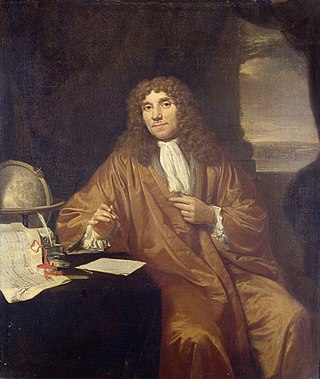
Delft is a city and municipality in the province of South Holland, Netherlands. It is located between Rotterdam, to the southeast, and The Hague, to the northwest. Together with them, it is a part of both the Rotterdam–The Hague metropolitan area and the Randstad.

Antonie Philips van Leeuwenhoek was a Dutch microbiologist and microscopist in the Golden Age of Dutch science and technology. A largely self-taught man in science, he is commonly known as "the Father of Microbiology", and one of the first microscopists and microbiologists. Van Leeuwenhoek is best known for his pioneering work in microscopy and for his contributions toward the establishment of microbiology as a scientific discipline.

Delftware or Delft pottery, also known as Delft Blue or as delf, is a general term now used for Dutch tin-glazed earthenware, a form of faience. Most of it is blue and white pottery, and the city of Delft in the Netherlands was the major centre of production, but the term covers wares with other colours, and made elsewhere. It is also used for similar pottery, English delftware.

The Sublime Porte, also known as the Ottoman Porte or High Porte, was a synecdoche or metaphor used to refer collectively to the central government of the Ottoman Empire in Constantinople.

Delfshaven is a borough of Rotterdam, Netherlands, on the right bank of river Nieuwe Maas. It was a separate municipality until 1886.

The Oosterscheldekering, between the islands Schouwen-Duiveland and Noord-Beveland, is the largest of the Delta Works, a series of dams and storm surge barriers, designed to protect the Netherlands from flooding from the North Sea. The construction of the Delta Works was a response to the widespread damage and loss of life in the North Sea flood of 1953.

Jan Joosten van Lodensteyn, known in Japanese as Yayōsu (耶楊子), was a Dutch navigator and trader.

HetPrinsenhof is a museum in the city of Delft in the Netherlands. Formerly the monastery of St Agatha, the building changed purpose over time. The whole building came into the possession of Delft City Council by 1925, who gradually converted the building into a museum. Today, the museum shows a variety of art from Dutch Golden Age paintings, prints, cermaics and contemporary art.

The Studentenstam De Delftsche Zwervers is a student society in Delft, Netherlands. Dating from 1915, it is the world's oldest student Scouting group, first as a club for former Scouts, from 1920 as a Rover crew. They are housed in the Scout Centre "Kruithuis", the monumental gunpowder ammunition dump of the Dutch Republic, designed in 1660 by Pieter Post. The members are students at the Delft University of Technology and other higher education institutions.

Nieuwezijds Kapel, or Heilige Stede or Chapel of the Heilige Stede refers to a site in Amsterdam that includes shops and a Dutch Reformed church built in 1908 on the site of a church once called the Heilige Stede, originally built in the 15th century to replace a chapel that burned in a city fire of 1452. That original chapel had been built in 1347 as a result of the miracle of Amsterdam, located on the Kalverstraat where this miracle with the eucharistic host occurred.

The Oost-Indisch Huis is an early 17th-century building in the centre of Amsterdam. It was the headquarters of the Amsterdam chamber of the Dutch East India Company. It is a listed Dutch national heritage site (rijksmonument).

View of Delft is an oil painting by Johannes Vermeer, painted c. 1659–1661. The painting of the Dutch artist's hometown is among his best known. It is one of three known paintings of Delft by Vermeer, along with The Little Street and the lost painting House Standing in Delft, and his only cityscape. According to art historian Emma Barker, cityscapes across water, which were popular in the Netherlands at the time, celebrated the city and its trade. Vermeer's View of Delft has been held in the Dutch Royal Cabinet of Paintings at the Mauritshuis in The Hague since its establishment in 1822.

The City Hall in Delft is a Renaissance style building on the Markt across from the Nieuwe Kerk. It is the seat of the city's government as well as a popular venue for civic wedding ceremonies. Most administrative functions have been transferred to an office inside the Delft railway station building. Originally designed by the Dutch architect Hendrick de Keyser, it was heavily changed over the centuries and was restored in the 20th century to its Renaissance appearance.

The Koninklijk Nederlands Legermuseum is the former national museum of the Dutch Army. Until 2013, it was located in the Armamentarium in Delft. In 2013 it was merged with the Militaire Luchtvaartmuseum, based on the former airbase at Soesterberg, where the new merged museum is based and where its new stores were opened on 13 May 2009 by Jeroen Sikkel, Secretary General for Defence.

Haaglanden was a conurbation surrounding The Hague in the Netherlands from 1992 until 2015. The city's position as the country's seat of government made the region prominent in the Netherlands. Located on the west coast of the province of South Holland, the region had a population of 1,050,543 in September 2013, and covered an area of 405 km².

Agnetapark was an area of workers' housing in Delft, South Holland, the Netherlands. It was one of the highest quality workers' housing areas built before the Housing Act of 1902 was imposed. It was 'transformed' from a marshy 4 hectares area of land to a 'paradise' of industry. It is named after Agneta Matthes as she helped transform it.

The Vermeer Centre is an information center dedicated to the painter Johannes Vermeer and the work of his contemporaries in Delft, the Netherlands.
Grand Summit is an unincorporated community in Cowley County, Kansas, United States.

The Battle of Delft, also known as the Defence of Delft, was a military engagement fought during the Eighty Years' War and the Anglo–Spanish War which took place in October 1573 in and outside the city of Delft. The battle was fought by a small Anglo-Dutch force under Thomas Morgan and an attacking Spanish force under Francisco de Valdez. The Spanish were repelled and forced to retreat.

The Leiden gunpowder disaster was an event in which a ship carrying hundreds of barrels of black powder exploded in the town of Leiden in the Netherlands on 12 January 1807. The disaster killed 151 people and destroyed over 200 buildings in the town.



















